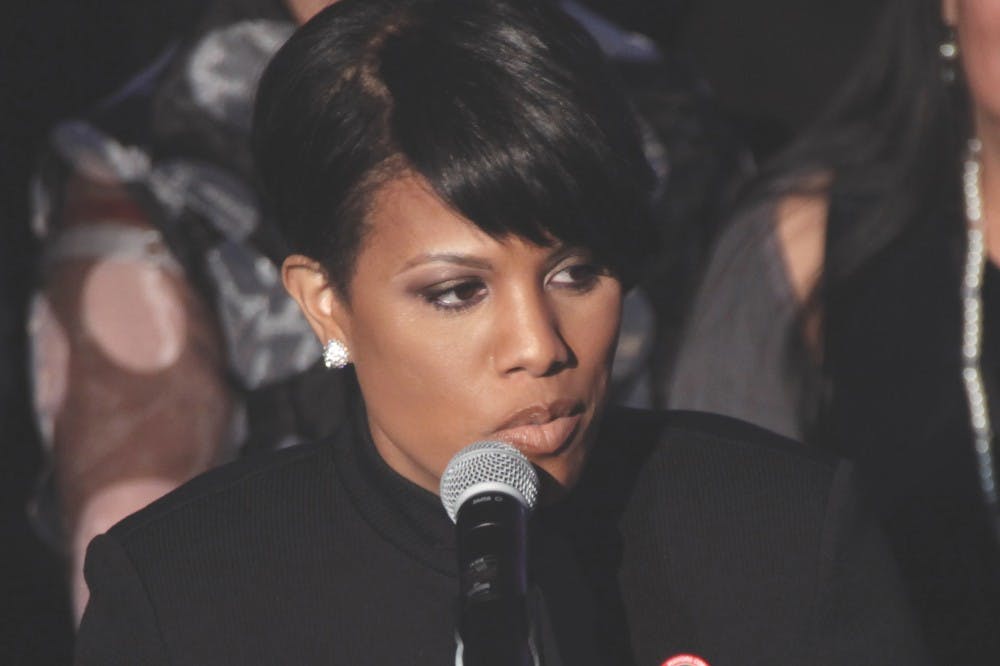Stephanie Rawlings-Blake, the former mayor of Baltimore, excoriated President Donald Trump during a visit to Penn Tuesday.
Rawlings-Blake, who currently is president of The United States Conference of Mayors and secretary of the Democratic National Committee, spoke to students in “Urban Communication,” an undergraduate communication course.
She was introduced by former Philadelphia Mayor Michael Nutter as “one of the great, great leaders and mayors in the United States of America,” and “my friend in this great and crazy world of politics.”
The conversation she had with the class was off-the-record, but Rawlings-Blake also spoke to The Daily Pennsylvanian about her triumphs and challenges, as well as her concerns about the Trump administration.
“I think we have lost our moral standing in the world and he continues to erode it every single time he opens his mouth,” she said. “In our country, we have had our challenges, but we had a lot to be proud of — and reverence for the people who take high positions of power has been one of them.”
“There’s nothing to revere with Trump,” Rawlings-Blake added. “It makes me sad not only for our country, but for our kids.”
She also wistfully mentioned her re-election this month as secretary of the DNC as well.
“I was very clear that I was interested in maintaining my role with the national party. I just had anticipated being reappointed by President Clinton,” she said.
Rawlings-Blake was thrust into the political spotlight when she assumed the mayorship of Baltimore at only 39-years-old, following the conviction of Mayor Sheila Dixon for embezzlement in 2009.
Her role in managing the unrest in Baltimore in 2015 following the death of 25-year-old Freddie Gray put national scrutiny on Rawlings-Blake once again.
Rawlings-Blake said her decision to have Republican Gov. Larry Hogan send the National Guard to Baltimore “was difficult for a number of reasons.”
“They don’t have a non-lethal response,” she said, calling to mind the National Guard’s last time in Baltimore, when they were ordered by a Republican governor to “shoot to kill,” in order to stifle riots in 1968 following the assassination of Dr. Martin Luther King, Jr.
“If you throw a rock, or a brick at them, you’re going to get shot,” she said. “I knew the potential volatility of bringing them in. But I worked to push back against a heavily militaristic response.”
“I also knew, at the time, that we were dealing with kids,” she added.
“From what I could see,” she said, Hogan “had one tool, which was a hammer, and everything looked like a nail.”
But despite her criticism of him for Hogan’s militaristic response to unrest, some Penn students think the mayor was too hard-lined in her response as well.
“I remember during the riots she said some really problematic things,” College sophomore Shanzeh Haque, a Baltimore native, said.
“First she called them ‘thugs,’ and then she basically insinuated that property was more important than black bodies or black lives,” Haque said. “As mayor of Baltimore, she had to stand up against what happened to Freddie Gray ... and she didn’t.”
But Haque also said she considers Rawlings-Blake an inspiration.
“As a black female, she was such an inspiration to so many little girls in Baltimore,” Haque said. “To see this black [woman] take on such an important role in our city is incredible.”
Desiree Peterkin Bell, who teaches “Urban Communication,” agreed.
“For a long time, I’ve been the brownest, often the only female, and often the youngest at a decision-making table,” she said.
“Young black women oftentimes don’t have leaders who look like them. They don’t have someone to aspire to,” Peterkin Bell said. “But in this generation, we have a whole new breed of women who are defining their own paths, and Stephanie Rawlings-Blake is one of them.”









